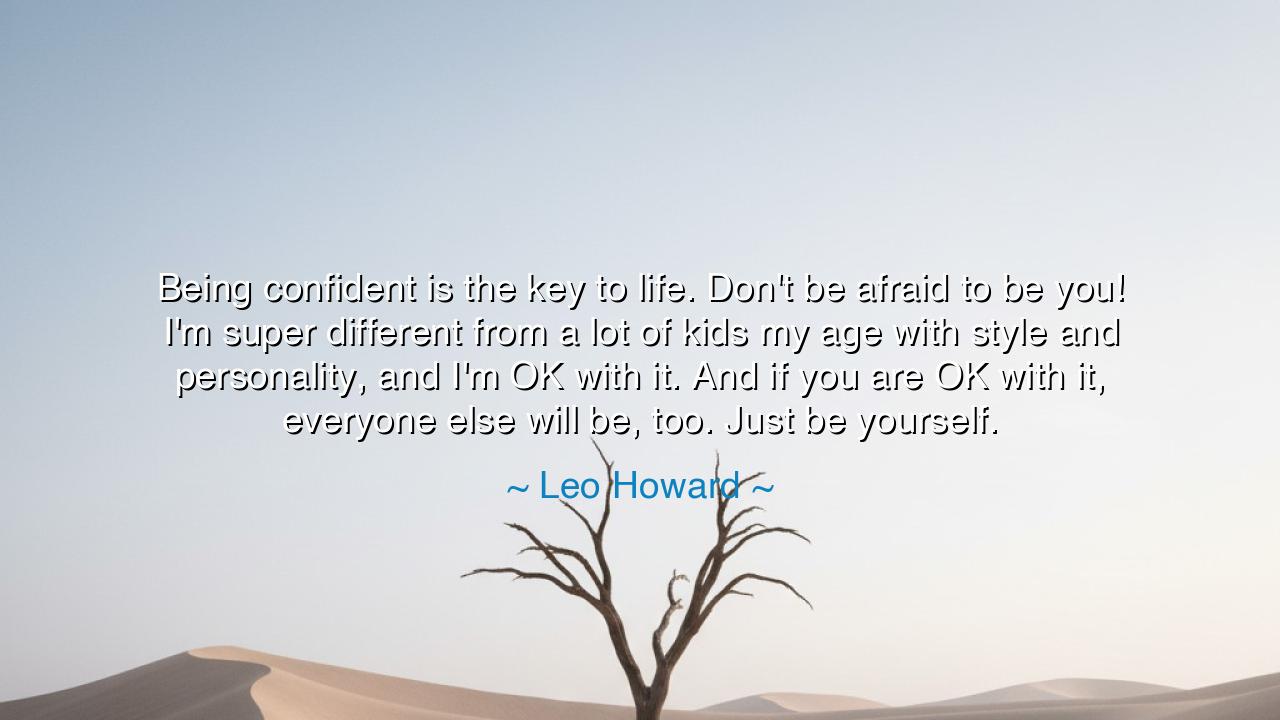
Being confident is the key to life. Don't be afraid to be you!
Being confident is the key to life. Don't be afraid to be you! I'm super different from a lot of kids my age with style and personality, and I'm OK with it. And if you are OK with it, everyone else will be, too. Just be yourself.






"Being confident is the key to life. Don't be afraid to be you! I'm super different from a lot of kids my age with style and personality, and I'm OK with it. And if you are OK with it, everyone else will be, too. Just be yourself." These words spoken by Leo Howard are a powerful declaration of the value of confidence and authenticity. In a world that often pressures individuals to conform to societal expectations, Howard's message stands as a beacon of freedom—freedom to express one’s true self without fear of judgment or rejection. At its core, the quote reflects the timeless wisdom that true strength comes not from mimicking others, but from embracing one’s uniqueness and standing tall in one’s own skin.
In the ancient world, the concept of self-authenticity and confidence was deeply intertwined with the notion of virtue. Socrates, the great philosopher of Athens, famously said, "Know thyself." This call to self-awareness was not just a search for knowledge, but a profound reflection on the importance of understanding one’s own nature and living in harmony with it. Socrates believed that the greatest form of wisdom came not from acquiring external knowledge, but from understanding one’s own soul, character, and place in the world. In much the same way, Leo Howard encourages us to embrace our true selves with confidence, as it is only by doing so that we can flourish and lead lives of meaning.
This embrace of one’s authentic self can also be seen in the life of Alexander the Great, a figure whose confidence was unparalleled. From an early age, Alexander was not afraid to embrace his heritage and role as a leader. He was tutored by Aristotle, who helped him see the importance of understanding the world, but Alexander’s true strength lay in his belief that he could shape the world according to his own vision. His confidence in his own abilities allowed him to unite a fractured world and leave an enduring legacy. Just as Alexander stood firm in his identity, Leo Howard’s words remind us that confidence is the foundation of personal greatness.
The ancients also revered individuality and personal expression in their art. In ancient Greece, the artist was seen not just as a craftsman, but as a visionary—a creator who imbued their work with their own soul and identity. The great sculptor Phidias, for example, poured his own vision of divinity into the statues he created for the Parthenon. His works were not simply representations of the gods, but reflections of his unique artistic interpretation of divine beauty. Similarly, Leo Howard’s encouragement to be yourself and to express your individuality, rather than conforming to others, speaks to the power of self-expression in the face of external pressures.
The lesson here is clear: confidence is not something we find externally, but something we cultivate within. It is through embracing our own uniqueness—our style, our personality, our voice—that we unlock the potential to truly succeed. Leo Howard’s message echoes a wisdom passed down from the ancients: only by knowing ourselves, accepting ourselves, and standing firm in who we are, can we navigate the world with the strength and purpose that makes us truly powerful.
Confidently being yourself also means embracing the parts of ourselves that make us different. In a world that often celebrates conformity, the greatest individuals are those who dare to be different—to stand apart from the crowd and define their own path. This was true for the ancient heroes, like Heracles, who, despite his incredible strength, faced trials that challenged his identity and force him to reassert his role in the world. Just as Heracles had to battle the external forces that sought to shape him, we too must battle the societal pressures that try to fit us into predetermined molds. Yet, in doing so, we gain the power to be the authors of our own stories, creating a life that is uniquely ours.
To take practical action from Leo Howard’s wisdom, we must first embrace self-awareness—to know who we are and be willing to express that truth without fear. This requires introspection, the courage to be vulnerable, and the discipline to stay true to ourselves even in the face of external pressures. Whether in our careers, relationships, or personal lives, we must prioritize our authenticity over pleasing others. In doing so, we not only cultivate personal growth, but we also inspire those around us to do the same.
Let us, then, heed the call of Leo Howard and the wisdom of the ancients: confidence is the key to living a fulfilled and meaningful life. It is not through perfection or conformity that we find strength, but through embracing our unique self and trusting in our own abilities. By being true to ourselves, we unlock a power that is both timeless and transformative, allowing us to live lives of purpose and authenticity. So, step forward boldly, as your truest self, and know that the world will meet you with respect and admiration.






AAdministratorAdministrator
Welcome, honored guests. Please leave a comment, we will respond soon